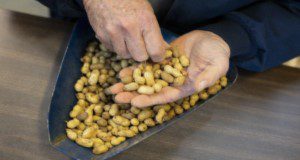Adults who are obese are often advised to lose weight to reduce the risk of chronic disease. However, the health benefits of weight loss change as we become older, and unintentional weight loss is linked to its own set of health risks. This new 3-page publication of the UF/IFAS Food Science and Human Nutrition Department discusses the risks and benefits of planned and unplanned weight loss for older adults. Written by Wendy Gans, Rachelle Savelle, Nancy J. Gal, and Wendy Dahl.
https://edis.ifas.ufl.edu/fs401
Tag: older adult
COAST: A Comprehensive Older-Adult Screening Tool
Nutrition risk screening is a first step to quickly identify individuals who might be malnourished or at risk of malnutrition. A malnutrition screening tool should be easy to use, quick to administer, and valid—able to correctly identify those at risk of malnutrition. The Comprehensive Older Adult Screening Tool (COAST) is a valid and practical tool to determine if community-dwelling older adults, specifically older adults of lower socioeconomic status, are at risk for malnutrition. This new 6-page publication of the UF/IFAS Food Science and Human Nutrition Department, written by Karima Alabasi, Nancy J. Gal, and Wendy J. Dahl, provides an introduction to COAST as well as the 5-question screening tool.
https://edis.ifas.ufl.edu/fs393

